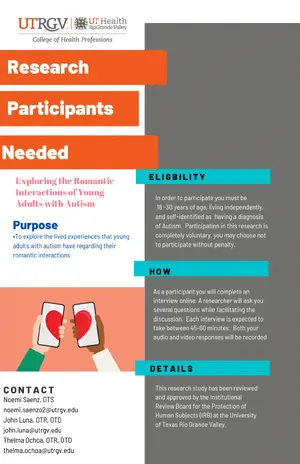Hello,
I am an Occupational therapy graduate student doing research on the lived experiences of individuals with Autism and dating. I am looking for a participant who'd be willing to do an interview via zoom for about 20 minutes, answering a series of open-ended questions.
Of course, everything will be kept confidential and no real names will be used.
Only criteria is: self diagnoses ASD, between 18-30 yrs old, and living independently.
Please message me if interested or have questions, your help is greatly appreciated!
I am an Occupational therapy graduate student doing research on the lived experiences of individuals with Autism and dating. I am looking for a participant who'd be willing to do an interview via zoom for about 20 minutes, answering a series of open-ended questions.
Of course, everything will be kept confidential and no real names will be used.
Only criteria is: self diagnoses ASD, between 18-30 yrs old, and living independently.
Please message me if interested or have questions, your help is greatly appreciated!
Attachments
Last edited:
